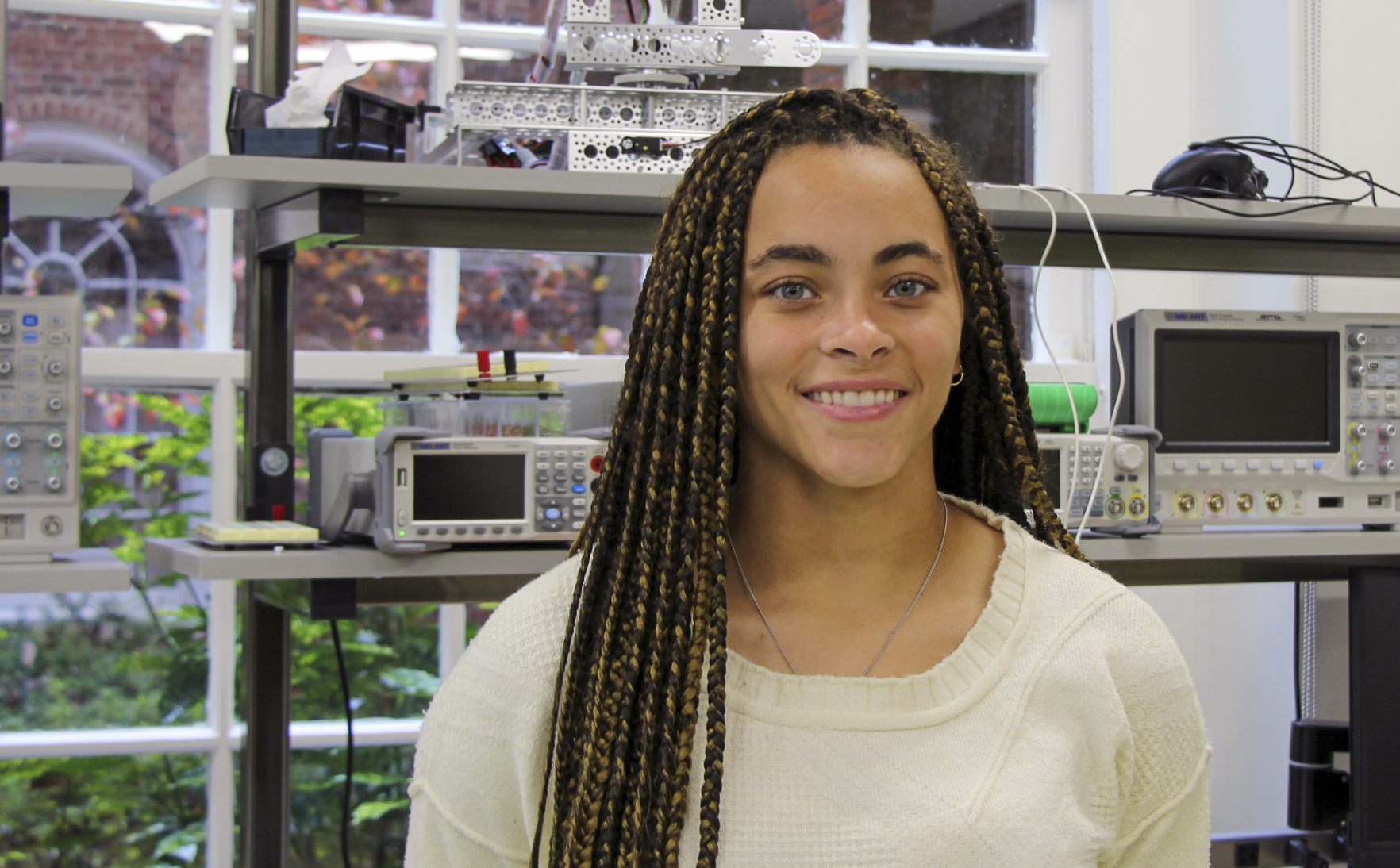Dominguez wants to design medical devices that change and save lives. Elon University’s Engineering B.S. program makes that possible.
Samantha Dominguez remembers the exact moment she decided to become a biomedical engineer.
She’d felt drawn to medicine already — many of her relatives are doctors and nurses — but didn’t feel a drive to follow in their footsteps. She wondered if being a doctor or nurse was all there was to do in the medical field.
Then came the day her Dallas, Texas, high school biomedical science class viewed a recording of a video-assisted robotic thoracoscopic surgery. Watching that tiny robot make incisions in a patient’s chest and perform surgery remotely was like seeing her future in fast-forward.
“It was the coolest thing I’d ever seen in my entire life,” Dominguez says. “The idea of it is incredible: That a doctor could be halfway around the world but performing surgery on someone. And people design those machines. I thought, ‘Wow, I could do that!’ It set me on the track.”
That track led her to Elon University’s Engineering Program.

Her Texas high school was a Project Lead the Way campus, emphasizing math, science and engineering, so Dominguez had already dabbled in engineering intro courses and the biomedical science class that ignited her passion. An aunt in North Carolina recommended Elon, calling it a hidden gem for its smaller size and strong academics.
That Elon is amid an ambitious advancement of engineering and other STEM programs — including a vision for new facilities for science, engineering and cross-disciplinary studies called the Innovation Quad — made her decision easy. Engineering at Elon began with a dual-degree program, allowing for two degrees: one bachelor’s degree in science or math from Elon and one engineering degree from a partner institution. During Dominguez’s senior year in high school, Elon announced it would begin offering its own four-year engineering degree.
“I got an email from Elon about the four-year engineering degree with a biomedical concentration. I said: This is it. This is the sign. I need to go here,” Dominguez said.
She was accepted to Elon University in 2018 as an Honors Fellow and with a soccer scholarship. During her Fellows weekend interview, she connected with Associate Professor of Engineering Sirena Hargrove-Leak.
“I could sense her motivation and her authentic desire to use her knowledge, skills and talent to help people,” Hargrove-Leak said. “It is always exciting when students recognize the value of humanity and humility in engineering.”
Dominguez’s mission to use engineering to save and improve lives has only strengthened at Elon.
“Being a biomedical engineer, I can do medical research. I can be the one who 3D prints a heart for someone to use as a transplant. The things I could do vary so much: Cancer research, or work on antiviral drugs, or making exoskeletons for people to be able to walk,” Dominguez said. “Of all those things, it will always have a positive impact on somebody’s life and their health. There are just so many things I could do in people’s lives to help make a difference.”
Currently enrolled in Hargrove-Leak’s EGR 221 Engineering Design for Service course, she and a team are designing an ergonomically enhanced stool to improve the experience of a woman with physical challenges working in Alamance County. The process has deepened Dominguez’s appreciation for the value of engineering.
“Dr. Hargrove-Leak calls it human-centered design,” she said. “You are meeting people, seeing how they would use a design, making drafts of it and taking it back to a client, asking: Would this work? Why or why not? You are tailoring it for people, and not just for what’s easiest or the most cost-effective. It’s one of the most thoughtful classes I’ve ever had.”
As an Honors Fellow and member of Elon’s current record-setting women’s soccer team, Dominguez works hard to balance life on the field with her studies. Her soccer skills earned her a scholarship to Elon alongside academics, so she takes both duties seriously.
“I pay attention to make sure I’m spreading time equally between them. I am here to play soccer, but I’m really here to get my degree,” Dominguez said.
That’s taken a tremendous amount of discipline, scheduling her days by the hour, making sure she’s getting enough rest to perform on the field while also ensuring she’s absorbing material needed to engage in the classroom.
That dedication paid off during her year at Elon when she was named the most improved women’s soccer player and received the Phoenix Award by the Phillips-Perry Black Excellence Awards for her GPA of 3.8-4.0. Somehow, she’s also managed to maintain a social life and be active on campus.
“She is so disciplined,” Hargrove-Leak said. “She is truly exceptional: She does all of those things and does them well.”
As Dominguez looks ahead, investigating research topics in medicine and sports-medicine fields, she’s particularly glad she chose Elon and engineering. The smaller size of the program has made for closer relationships with faculty, whom she says are “always there for their students.” The strong emphasis on liberal arts and cross-disciplinary learning has taught her to question the world and find solutions in new ways. She’s looking forward to studying abroad, an opportunity she wouldn’t have without Elon’s J-term, and for service-learning opportunities that don’t exist at other universities.
“There are so many different opportunities for you at Elon that will give you an advantage in your future,” Dominguez said. “You’re so versatile when you come out of our program. The opportunities are just endless.”



